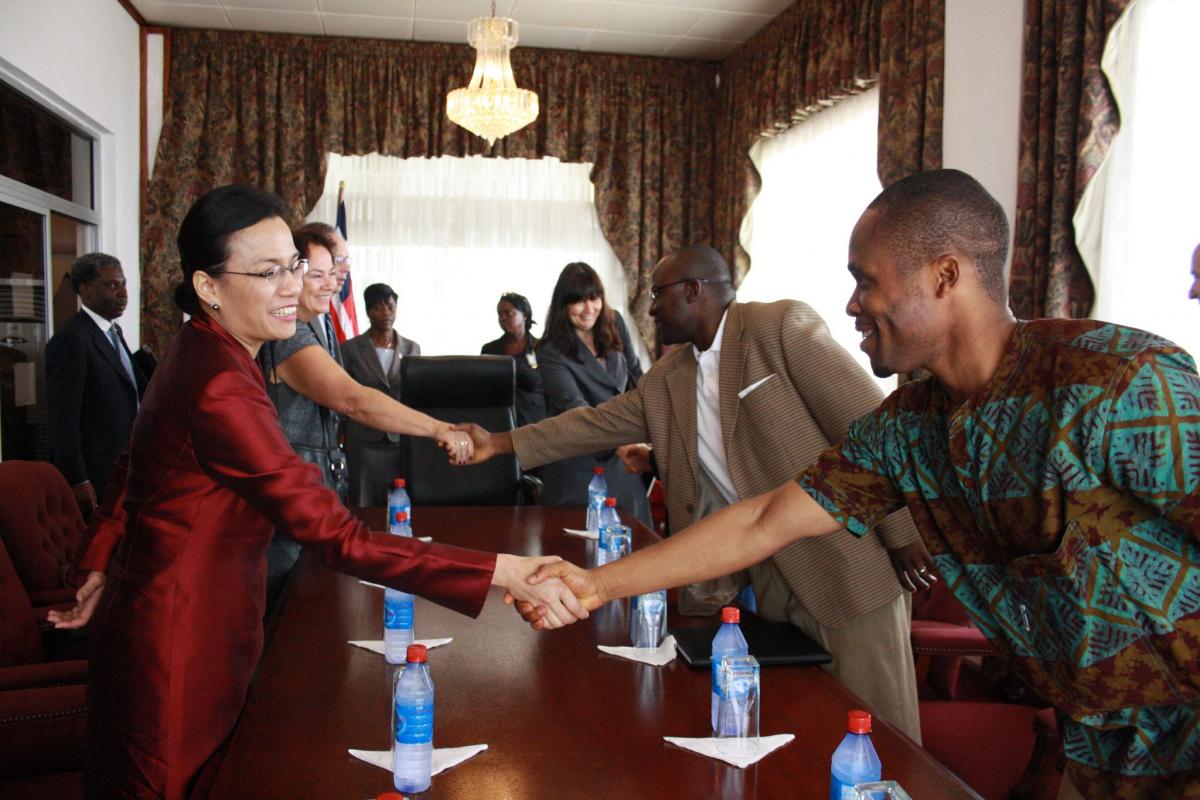
“Ebola entered Monrovia like an invading army stealthily arriving under cover of darkness and taking positions across the city. Then the explosion happened. The sick, the dead, the uncollected bodies overwhelmed our response,” described Gyude Moore, (MSFS ’09) Public Works Minister-Designate for the Government of Liberia. The Ebola crisis started out slow in Liberia, with only a few cases in the north of the country, Moore remembered. “We went almost 30 days without a new case. That lull was a stroke of genius on the part of the virus,” Moore recalled. The nature of the disease enabled Ebola to spread rapidly in Liberia as soon as the outbreak exceeded the response.
Coming Full Circle
Moore had an unlikely journey to his current role at the forefront of Liberia’s Ebola response. He grew up in Liberia until the civil war broke out in 1989, forcing his family to flee the violence to Cote D’Ivoire. Moore was able to come to the United States to study after fortuitously hearing about scholarships for Berea College in Kentucky. He continued his education at the Master of Science in Foreign Service (MSFS) program at Georgetown’s School of Foreign Service. However Moore always planned to return to Africa following his education, “[I] always planned on returning to Africa. [It] wasn’t always clear it would be Liberia, but…definitely planned on returning to Africa.” When contemplating his plans after MSFS, Moore envisioned himself working for an international development organization and eventually the government of Liberia.
Moore’s opportunity for government service came earlier than he had imagined, when he took a job as a Program Officer working in the Office of Liberian President Ellen Johnson Sirleaf shortly after his MSFS graduation. Returning to life in his homeland after many years in the United States was a transition. “You prepare yourself for the return, but nothing is the same,” Moore said. “On the continuum of development, DC and Monrovia are at the two extremes. So initially it was hard – no power, no running water. But after a month, everything became normal.” Moore’s career progressed quickly – from Program Officer to Head of the President’s Delivery Unit/Deputy Chief of Staff, to his recent nomination as Liberia’s next Public Works Minister. Moore credits his success to the education he received at MSFS. “The MSFS experience was so…complete that when I started work in the President’s office, it had a strangely familiar feel. That was incredible. At MSFS, you are drilled through the skills that result in high-quality decision-making and exercising great judgment. That’s how I could go from a Program Officer to Public Works Minister-Designate in five years.”
Facing Ebola
Moore’s position with the President’s Program Delivery Unit put him out front on Ebola. “My unit, the President’s Delivery Unit, monitors implementation of the country’s development agenda on behalf of the President. We are the President’s toolbox…When all is well, we do routine maintenance, ensure the system keeps functioning. When all is not well (which is usually the case) we come in and fix stuff. We remove bottlenecks and drive delivery….[the]Ebola response became my job.” It was clear from early on in the crisis that it was beyond the capacity of the Liberian government to manage the situation alone. “This was a disease that was killing the people most equipped to deal with it – health care workers. At that point, we knew we were in trouble,” Moore said. Since the outbreak of the disease in Liberia, there have been 8,478 cases and 3,605 deaths, according to the World Health Organization.
The Ebola epidemic in West Africa was the first time the global health community had seen an Ebola outbreak of this scale and devastation. At a conference on Ebola held at SFS in September 2014, President Sirleaf expressed hope that using the current situation as a case study can prevent future outbreaks. “This would be a good case study,” she said. “See where we are today, look at the measures we are taking, study, conduct data analysis and two years from now present a paper and tell us, were the projections correct?”
Due to the extreme contagion of the Ebola virus and the resulting catastrophic effects, Moore sees the major lesson learned as the importance of appropriately scaling the response at the outbreak of Ebola. “In the future, the response at the beginning must be [strong]…. The response must overwhelm the outbreak at the onset. That way every single case isolated, every contact is traced to the last man. Anything else will be a disaster. The outbreak cannot exceed the capacity of the response. If that happens, you get a Liberia or Sierra Leone. Left unchecked, one case could generate a 100. It is very, very important to over-respond at the outset.”
Trusting the Process
Now that Liberia is slowly emerging from the heat of the crisis, there will be a long road back for the belabored country. Moore’s training and experience will serve him well as he participates in the hard work of rebuilding. He urged current Georgetown students to trust that their education and time spent on the Hilltop will prepare them similarly for their future positions. “Trust the process,” Moore said. “The sum total of your experience will prepare you for the hardest jobs in the world and you will be ready…It’s difficult to imagine how else I would have been ready for the last incredibly eventful 5 years had I not come through [Georgetown].” He also urged international students to think locally in their graduate experience. “There are a lot of opportunities in DC, I think you should take advantage of them, while you’re at GU. But once that is done – look home. That’s where the future is. This is especially true for students from Africa, like I was,” Moore said.